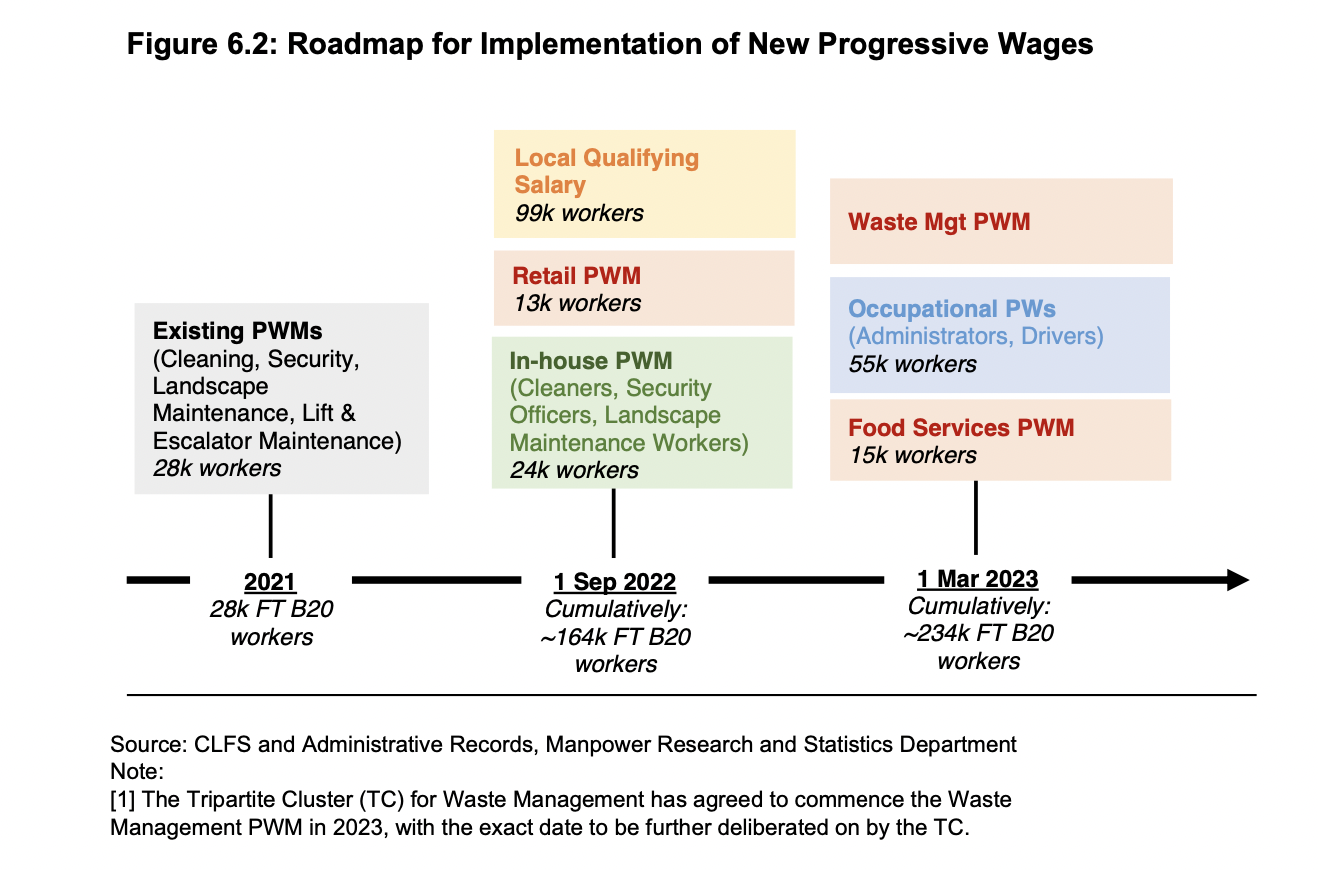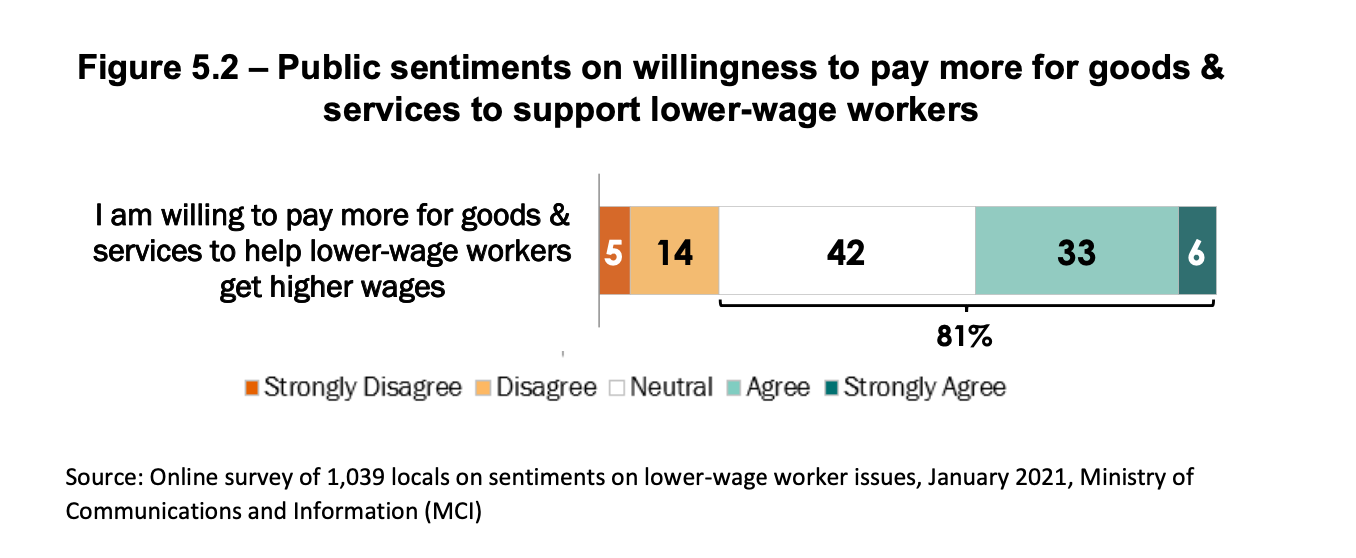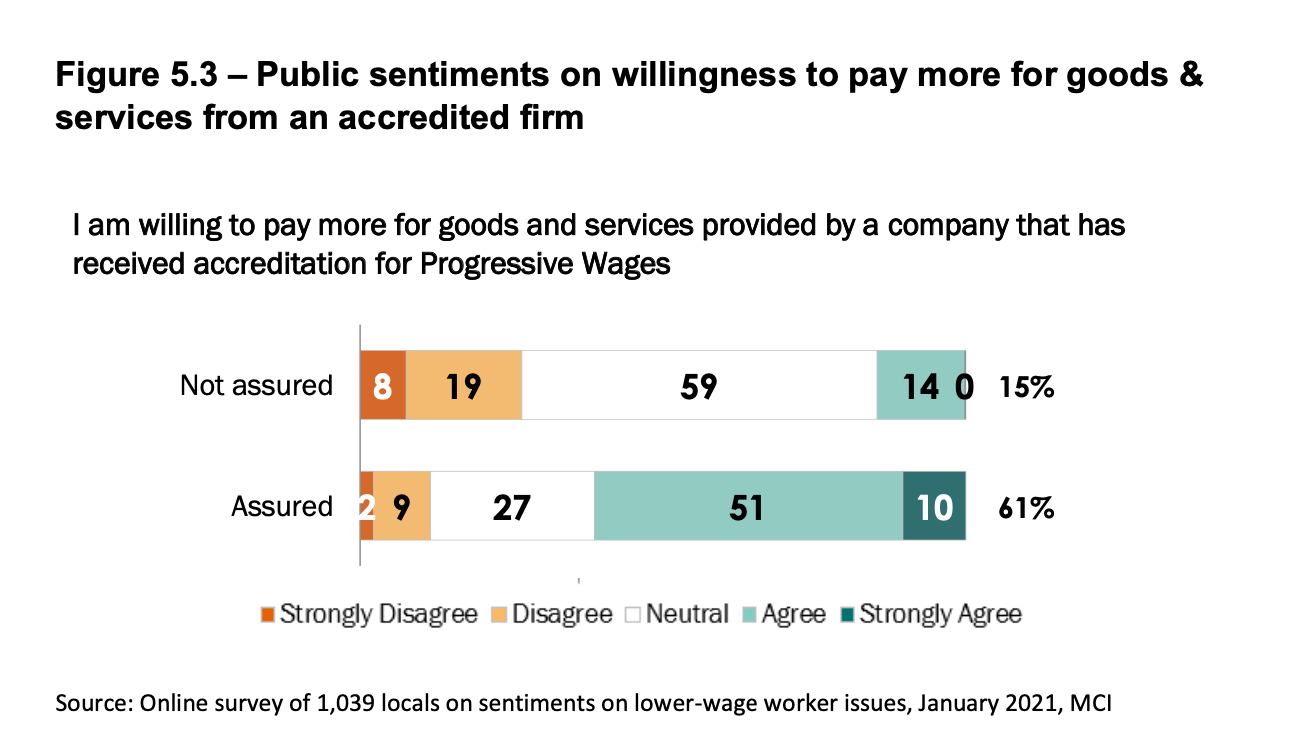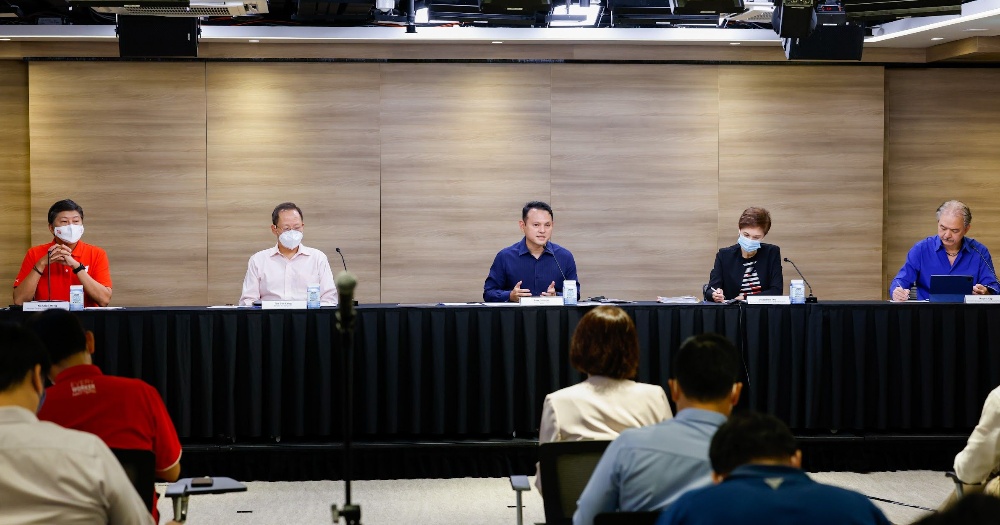Follow us on Telegram for the latest updates on Covid-19: https://t.me/mothershipsg
The government has accepted all 18 recommendations by the tripartite workgroup on lower wage workers, in an announcement made in a press conference on Aug. 28.
Manpower Minister Tan See Leng noted that the workgroup, after 10 months of deliberation, has charted a roadmap to uplift the wages and well-being of lower-wage workers for the next decade, and to build an inclusive economy and society.
The new measures, which include extending Progressive Wages to more sectors and occupations, and mandating firms hiring foreign workers to pay all local workers at least the Local Qualifying Salary, are expected to cover more than 8 in 10 (~82 per cent) of lower-wage workers.
Chairman of the Workgroup and Senior Minister of State for the Ministry of Manpower and Defence Zaqy Mohamad shared that with the Progressive Wage Mark ("PW Mark") initiative, the recommendations will potentially reach more than 9 in 10 (94 per cent) of workers.
The recommendations will be implemented in two phases – (i) from Sep. 1, 2022; and (ii) from Mar. 1, 2023 – according to the Workgroup's full report.
 Via Ministry of Manpower
Via Ministry of Manpower
For the uninitiated: Lower-wage workers are currently defined as the bottom 20th percentile of income earners, with the 20th percentile of gross monthly income (excluding employer CPF contributions) at or below S$2,033 in 2020.
Approximately 283,000 (83 per cent) of lower-wage workers are full-time employees, while about 107,000 (27 per cent) are self-employed, according to the Ministry of Manpower (MOM).
Requiring of local qualifying salary for all S'porean workers
One of the more significant measures, as announced by Prime Minister Lee Hsien Loong in yesterday's National Day Rally, is that all firms looking to employ foreigners will have to pay at least the Local Qualifying Salary (LQS) to all local workers.
The Workgroup announced that this will begin from Sep. 1, 2022.
Presently, companies are already paying the LQS, but only to some of their local employees, depending on how many foreigners they hire.
Leveraging on the current Work pass system to ensure sustained wage growth, MOM shared that employers will be required to pay the prescribed Progressive Wages and LQS from Sep. 1, 2022, before they can access any foreign workers.
To give an example, this means that if one has 20 local employees in the company, and needs two local employees to qualify for a foreign worker, one will have to ensure all 20 local employees are paid the LQS first, before they can be eligible for the foreign worker quota.
This, however, will not change the calculation of the quota for foreign workers, clarified MOM, which will continue to be based on existing calculations.
That is:
- The number of locals paid at least the LQS (S$1,400 currently) will count as one local worker,
- Those paid at least half of the LQS (at least S$700 to below $1,400) will count as half a local worker, and
- Locals paid below S$700 will not count towards the firm’s FW quota
To ensure compliance for the new measures, MOM shared that non-compliant employers will be notified about the underpayment of wages, and given reasonable time to rectify the underpayment, or be unable to apply for or renew Work Passes.
Once the underpayment is rectified, the full functions of the company's Work Pass accounts will be restored.
Extending PWM to more sectors and occupations
To uplift the wages of more lower-wage workers, other measures, such as the expansion of the Progressive Wage Model (PWM) to cover new sectors, including retail, food services and waste management, will also be progressively launched from Sep. 2022.
This will begin with the retail sector from Sep. 1, 2022, followed by the Food Services sector from Mar. 1, 2023, and Waste Management from 2023.
The existing Progressive Wage Model (PWM), which already covers cleaners, security guards, landscaping, and lift maintenance workers, will also be extended to include in-house workers from Sep. 1, 2022.
These include cleaners, security officers and landscape maintenance workers from hotels, facility managers, food services firms and other businesses.
In addition, from Mar. 1, 2023, a new Occupational PWM will be introduced, to lower-wage workers in Administrator and Driver-type jobs.
MOM said that this would account for a significant number of lower-wage workers working across a wide range of sectors, for which the sectoral PWM approach would not be feasible to apply.
The value of a new "PW Mark" scheme
According to a Jan. 2021 online survey by MCI, 81 per cent of Singaporeans surveyed were neutral or willing to pay more for goods & services to raise the wages of lower-wage workers, while 61 per cent were willing to pay more for goods & services from an accredited firm.
 Via Ministry of Manpower
Via Ministry of Manpower
 Via Ministry of Manpower
Via Ministry of Manpower
To further help consumers identify companies that pay Progressive Wages, the Progressive Wage Mark ("PW Mark") will thus be launched to accredit companies that are paying their workers Progressive Wages.
A "PW Mark Plus" will be conferred to firms that not only pay Progressive Wages, but also advance the well-being of their lower-wage workers.
Sharing about the value of the "PW Mark" during the press conference, Minister for Communications and Information Josephine Teo said that especially for the retail and food services sectors, this "PW Mark" will help consumers in identifying these companies more easily, and allow society to "chip in" to lend their support to these employers.
Firms can qualify for the Mark by paying all applicable employees at least the relevant Sectoral or Occupational PW wage rungs, and paying all other local employees at least the Local Qualifying Salary (LQS).
Other recommendations
During the press conference on Aug. 28, Zaqy shared that the report was prepared in consultations with over 1,800 stakeholders, including union leaders, business leaders, lower-wage workers, academics, and HR professionals.
Teo emphasised,
"[To] get to this 83-page report – at least the last time I saw it, it was 83 pages – it has not been easy. Every single page involved quite a few serious, and sometimes, late night discussions.
What the Tripartite Workgroup has in fact been able to do is to chart the many steps we must take systematically for a whole decade. Things are not going to happen overnight. If we really want to achieve the ambitions we have set out for ourselves, it is going to take a while, and we have to do it in phases. We have to do it systematically."
In total, 18 recommendations in three key areas were proposed, of which:
- Seven recommendations were to evolve the Progressive Wage Model's coverage, and boost wages to gain ground with median,
- Four recommendations were to leverage Singapore's institutions for sustained wage growth, and
- Seven recommendations were to garner "whole-of-society" support to uplift the well-being of lower-wage workers’
Related stories:
Top image courtesy of Ministry of Manpower
Follow and listen to our podcast here
If you like what you read, follow us on Facebook, Instagram, Twitter and Telegram to get the latest updates.
